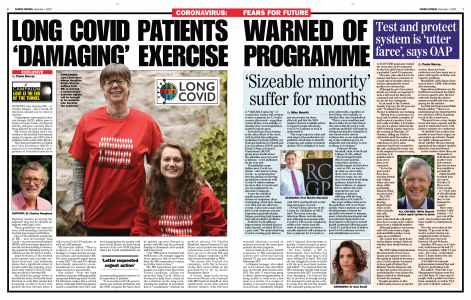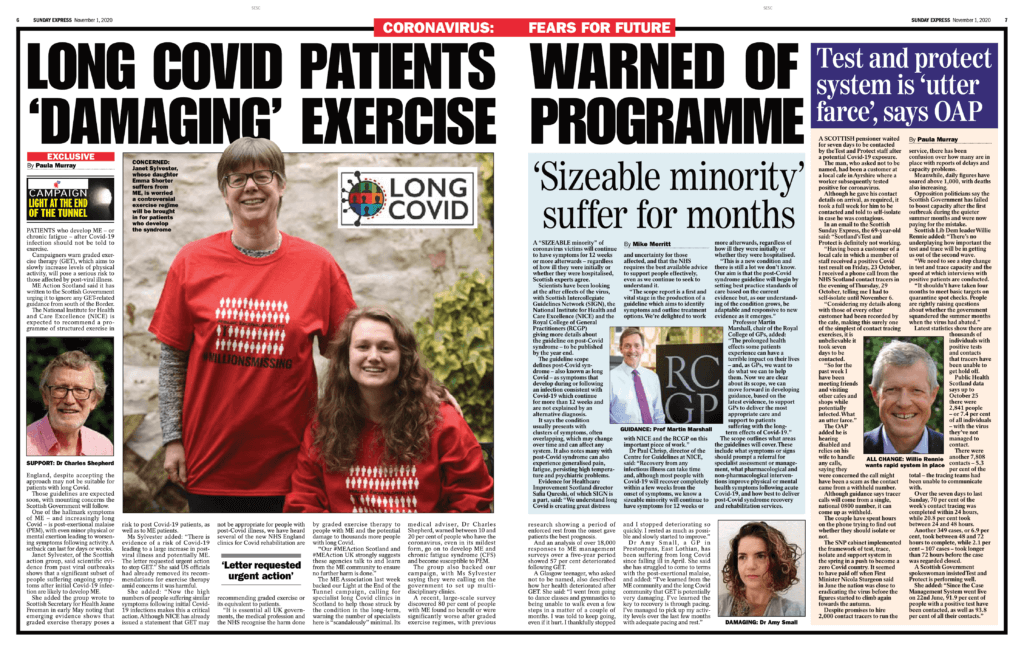#MEAction UK is getting the message out – don’t exercise if you have post-exertional malaise. We’ve sent a press notice to the UK media ahead of the release of draft revised National Institute of Health and Care Excellence guidelines on ME/CFS on 10th November. We’re highlighting the links between “Long Covid” and ME. In particular, we want people at risk to know about the danger of exercise if they have post-exertional malaise. We’ve already had a great article in Scottish Sunday Express and we will be doing more in depth work with press contacts before we put out a statement about the draft guidelines.
Click below to read the Scottish Sunday Express article:
#MEAction UK Press Release
COVID-19 Patients are at Risk of Developing Myalgic Encephalomyelitis
Many of the symptoms that some sufferers are experiencing after initial COVID-19 infection are not new or mysterious, according to #MEAction UK. Scientific studies are clear that myalgic encephalomyelitis (ME) often results from a viral infection and there have been significant increases in the number of people with ME following previous epidemics.
ME Being Triggered By A Viral Outbreak Is Not New
Speaking for #MEAction UK, Sian Leary said “Scientific evidence from past viral outbreaks shows that a significant subset of people suffering ongoing symptoms after initial COVID-19 illness are likely to develop ME.”
In July, #MEAction UK wrote to UK Health Secretary Matt Hancock asking him to take immediate action to request that an immediate warning be put out to health authorities regarding graded exercise therapy and the current ME/CFS guidelines – noting that it harms a majority of people with ME. Critically the Health Secretary was asked to ensure all government and NHS England advice on post-COVID treatment and rehabilitation addresses the fact that patients could develop ME and that graded exercise and activity harms this patient population.
In early May, Professor Chris Ponting, Chair of Medical Bioinformatics at University of Edinburgh. explained that he would “expect that [of the] people who have COVID-19 symptoms quite severely… about 10% [would] have fatigue-like syndromes after 6 months, given current evidence.”
Dr. Alain Moreau, Université de Montréal, concurred. “Coronavirus leading to more cases of ME will happen for sure, unfortunately. (In) a previous study in which ~200 people who survived the ICU in a previous outbreak of a coronavirus infection (SARS), close to one third developed ME/CFS-like symptoms… there are some preliminary reports of the same from COVID-19…. The question is not ‘will this happen’ but how many will suffer?”
Sadly, these predictions are now being seen to play out.
Dr. Anthony Fauci, Director of the US National Institute of Allergy and Infectious Diseases and member of the White House Coronavirus Task Force, has emphasised in several interviews that people who are not recovering after contracting COVID-19 are showing symptoms “that are highly suggestive of myalgic encephalomyelitis and chronic fatigue syndrome,” including severe fatigue, cognitive problems, chills and sweats and sleep problems.
People with Post Exertional Malaise Should NOT be Encouraged to Exercise
Long-COVID patients are already reporting ME-like symptoms including the hallmark symptom of ME, post-exertional malaise.
Dr Amy Small, a GP in Lothian who became ill early on in the outbreak, commented, “Having always been a very active person prior to long COVID, running several times a week and doing other exercise, I have found it very difficult to come to terms with the post-exertional malaise I suffer now. I have, however, learnt, both from the ME community and the long COVID community that GET is potentially very damaging. It’s not in my nature not to “push” myself but I’ve learnt that the key to recovery is through pacing. Pacing isn’t as straightforward as it would seem but I have gradually managed to pick up my activity levels slowly over the last few months with adequate pacing and rest.”
Post-exertional malaise (PEM) is a cardinal symptom of ME, unique to the disease, where cognitive or physical overexertion can lead to a flare of symptoms and/or the appearance of new symptoms, typically presenting 12 to 48 hours after the triggering event. People with post-exertional malaise or who have been diagnosed with ME should NOT be recommended to undertake graded exercise, which can have very serious, long-term consequences for their health.
NICE Continues to Recommend Graded Exercise for ME
Unfortunately, the current treatment for ME recommended by the National Institute for Health and Care Excellence (NICE) is Graded Exercise Therapy (GET), which thousands of people with ME have long reported causes a deterioration in their health after undertaking graded exercise, even at low levels and for short periods of time. A recent, large-scale survey found that 80% of people with ME found no benefit or were significantly worse after graded exercise regimens. Research has shown that people with ME who were given a period of enforced rest from onset had the best prognosis.
Exercise protocols prescribed for myalgic encephalomyelitis (ME) were powerful enough for Cherry to ignore the physiological realities of her disease. Cherry is now 100 percent bedridden. When 16-year-old Cherry from North London began the treatment prescribed for her ME in 2013, she was able to walk to her local hospital’s Fatigue Clinic. Her consultant had fast-tracked Cherry to immediately begin sessions of GET, in which patients work to gradually increase their activity and exercise levels.
It quickly became clear that pushing herself to build her activity levels was worsening Cherry. After six months of trying to push herself, Cherry had to send her mother to her six-month review consultation as she had become too weak to leave her bed, and had increasing neurological symptoms such as severe, daily headaches.
“We embarked on it in good faith because the doctor had a very good manner. The problem with the disease is that you can do massive damage to your body systems, but it often doesn’t show up until months later. In hindsight I believe that the hospital consultant should have told Cherry to take a year and rest and let her body heal” said Cherry’s mother, Rachel.
Cherry’s deterioration after undergoing GET is a common experience in the ME community. An analysis of over 18,000 patient responses to surveys on management of ME symptoms over a five year period reported that 57% deteriorated following GET.
#MEAction UK is demanding that NICE removes Graded Exercise Therapy from the recommendations in the revised guidelines for ME/CFS, a draft of which will be published this November. We have been campaigning for this for many years. The Centers for Disease Control in the US has already removed its recommendation for GET and has stated that graded exercise may cause harm.
“Now the high numbers of people suffering similar symptoms following initial COVID infection makes this a critical action,” said #MEAction UK’s Sian Leary. “Although NICE has already issued a statement that GET may not be appropriate for people with post COVID illness, we are concerned that several of the new NHS England clinics for COVID rehabilitation are recommending graded exercise or its equivalent to patients.”
It is essential that UK governments, the medical profession and the NHS recognise the harm done by Graded Exercise Therapy to people with ME and the potential damage to thousands more people with long COVID. ME Action UK strongly suggests that these agencies talk to and learn from the ME community to ensure no further harm is done.
See #MEAction’s campaign for people to Stop, Rest Pace.
Further Information
#MEAction UK is an organisation of patients, carers and allies fighting for recognition and research for ME.
- Stop Rest Pace and “I got a virus” video https://www.meaction.net/2020/10/21/sian-stop-rest-pace/
- The connection between ME and long Covid https://www.meaction.net/long-covid-me-understanding-the-connection/
- Graded Exercise potential harm to people with long Covid https://www.meaction.net/2020/07/15/take-action-graded-exercise-harming-people-with-me-and-covid-long-haulers/
- Analysis of patients’ reports of impact from GET/CBT treatment https://journals.sagepub.com/eprint/hWSxVIBTzDtqisvafkhE/full
- Letter to Matt Hancock https://www.meaction.net/2020/07/15/take-action-graded-exercise-harming-people-with-me-and-covid-long-haulers/
- Analysis of patients’ reports of impact from GET/CBT treatment https://journals.sagepub.com/eprint/hWSxVIBTzDtqisvafkhE/full
- Research showing majority of ME patients who received GET got worse https://journals.sagepub.com/eprint/hWSxVIBTzDtqisvafkhE/full
- Patient survey showing harm from GET https://www.meaction.net/2019/04/03/get-and-cbt-are-not-safe-for-me-summary-of-survey-results/
- A study on Epstein-Barr virus, Q Fever, and Ross River virus showed that ~12% of subjects across the board met ME/CFS criteria at 6 months after clearing the infection. https://pubmed.ncbi.nlm.nih.gov/16950834/
- A study of people with mononucleosis (Epstein-Barr virus) produced identical numbers – ~12% of subjects across the board met ME/CFS criteria at 6 months after clearing the infection. https://pubmed.ncbi.nlm.nih.gov/11063953/
- US Centre for Disease Control ON Post-exertional malaise https://www.cdc.gov/me-cfs/healthcare-providers/clinical-care-patients-mecfs/treating-most-disruptive-symptoms.html







2 thoughts on “Long COVID Patients Warned of Damaging Exercise Programme”
This is a fantastic article the likes of which I have waited three decades to see. Well done indeed to all involved in it. Just one cautionary note though. Having lived in England during the setting up of the specialist clinics for ME. I found that the notion of multidisciplinary clinics is a dangerous one as it allows the behavioural proponents in and then you are stuck with them. All we need in Scotland for Covid or ME is the same as any other illness, knowledgeable consultants and GPs who are then able to refer patients on to any other discipline needed.
I was diagnosed with ME in the early 1980s. I was never given any guidance apart from, ‘If you are feeling very well, do not do anything strenuous as it is likely you will overdo it’.
For some 15 months doing no deliberate exercising, the debilitating effects gradually lessened and with moderate exercise at irregular intervals I slowly reached a state where was able to get back to a normal life that included playing squash. Some 3 years after being diagnosed, I felt completely over it. I was able to carry on with a full active life that included playing squash, badminton, tennis and going to the gym and working hard with HIIT aerobics and working with very heavy weights until I was 81.
In November 2020, after a 24 hour stay in hospital, I caught Covid which since has been diagnosed as Long Covid which is still troubling me 6 months later. As well as the usual Covid symptoms of breathlessness, heart pains, aching muscles, dizziness and generally feeling tired, I feel certain that my ME has returned.
Having gone from super fit and being classed as being in the top 0.5% of 81 year old, I am now unable to do any of the things I did before catching the Covid-19 virus. Short walks 2 or 3 times a week is all I am doing. I start feeling tired during the walk with my thighs aching, the heart pains start and the breathlessness increases. Shortly after the tiredness and aches and pains get progressively worse and I get sleepy tired and start yawning. By the next morning I have recovered a lot but feel listless and in a can’t be bothered mood. (Possibly my body telling me to rest?).
My wife tells me much of my current malaise is very similar to the time I had ME. I am glad I have seen this as I shall now discuss it further with my doctor and the Cardiology Consultant at the hospital.
Comments are closed.